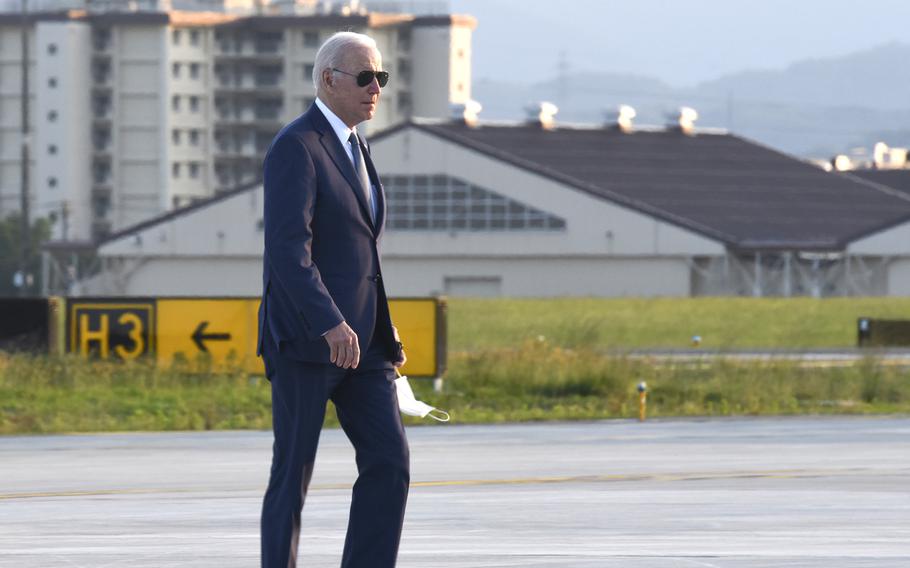
President Joe Biden walks toward Air Force One as he departs Yokota Air Base, Japan, on May 24, 2022. Biden will travel to the Middle East in July. (Kelly Agee/Stars and Stripes)
American presidential trips to the Middle East are always freighted with anticipation and apprehension, but few have been burdened with the geopolitical baggage attached to Joe Biden’s visit — to Jerusalem Wednesday and Jeddah later in the week. Unusually, the guest will be as anxious about the outcome as his hosts.
Biden, having come to office with ideas about deprioritizing the Middle East in U.S. foreign policy, now wants to reassert what he calls America’s “vital leadership role” in the region’s affairs. But Israeli and Arab leaders need proof that Biden is serious about taking on that role. The princes of the Gulf states are especially skeptical, sensing that the president will say anything to get them to pump more oil.
Doubts about his sincerity center on his attitude toward the country that the Israelis and Arabs fear most: Iran. They believe Biden, eager to revive the 2015 nuclear deal Tehran struck with the world powers, is too tolerant of Iran’s destabilizing activities in the region, ranging from financing and arming a wide network of militias and terrorist groups to enriching uranium to levels well beyond any peaceful purpose.
Biden has argued that the deal, known as the Joint Comprehensive Plan of Action, will constrain Iran’s nuclear program. He also hopes to persuade Tehran to agree to a follow-up deal to end its non-nuclear threats to the stability of the region.
This is a 180-degree departure from the policies of his predecessor, Donald Trump, who pulled the U.S. out of the JCPOA and sought to restrain Iran’s activities by imposing tight economic sanctions.
The Biden administration has for the most part looked the other way as Iran has flouted the sanctions, exporting ever more oil and greatly increasing its military spending. One of Biden’s first acts upon taking office was to overturn Trump’s decision to designate the Iran-backed Houthi rebels in Yemen as a terrorist group.
All this seems naive to the Israelis and Gulf Arabs, who point out that Biden has gotten nothing in return for his conciliatory attitude. Iran will not even negotiate directly with the U.S., preferring to use European intermediaries. Tehran has made no meaningful concessions; on the contrary, Biden’s chief negotiator says Tehran has added new demands even as it has sped up its enrichment activities.
More than likely, Iran is deliberately dragging out negotiations until it has achieved the status of a nuclear weapons threshold state, akin to Japan and South Korea, which have stopped short of weaponizing their stockpiles. The United Nations nuclear watchdog says Iran already has enough material for one bomb. In effect, Iran is enhancing its ability to terrorize its neighbors and blackmail the international community while pretending that enrichment is just a pressure tactic to bring the U.S. back into the JCPOA.
There are some signs that the wool is finally falling from Biden’s eyes. His officials have acknowledged that prospects of a return to the nuclear deal “are tenuous at best” and have announced new sanctions against Iranian oil smuggling. They are also warning of Tehran’s threat extending beyond the Middle East: On Monday, U.S. National Security Adviser Jake Sullivan announced that Iran was preparing to provide Russia with up to several hundred drones, likely for use in the invasion of Ukraine.
Under the circumstances, the president will be hard-pressed to explain in Jerusalem and Jeddah why he still clings to hope that a return to the JCPOA is possible, or that Tehran will agree to a second deal to curb its non-nuclear menace. Nor will his hosts be satisfied with vague promises of a Mideast security alliance against Iran.
Rather than try to defend the indefensible, Biden should take the opportunity to make a clean break from his failed Iran policy. On Thursday, the seventh anniversary of the announcement of the JCPOA, the U.S. president should announce that time has run out for its revival. He should end the charade of negotiations and press the other signatories to invoke the “snapback” feature in the deal, which imposes broader United Nations sanctions on Iran.
Not all the signatories will agree, but it will take only one; the terms of the JCPOA allow no veto. The Europeans, like the U.S., are losing patience with Iran’s refusal to make a deal. China and Russia will disagree: President Vladimir Putin is traveling to Tehran next week in a show of solidarity. But unlike in 2020, when Trump’s attempt to impose the snapback was met with universal derision, nobody can argue that his successor hasn’t made a sustained, good faith effort to revive the deal. The added sanctions might not stop Iran’s race toward nuclear threshold status, but neither will Iran be able to continue pretending that its enrichment activity is merely a bargaining tactic.
In the meantime, the Biden administration should rigidly enforce U.S. sanctions, starting with a crackdown on all who enable Iran’s illicit oil trade — including some Gulf Arab individuals and companies. And it should provide the Israelis and Arabs the weapons they need to defend against Iran and its proxies.
The president may have started his trip to the Mideast with a metaphorical hat in hand. But by seizing the initiative on the issue that causes his hosts the greatest worry, he can make the visit a turning point for the region. If he is sincere about reclaiming America’s “vital leadership role” in the Mideast, Biden should demonstrate leadership where it is most vital.
This column does not necessarily reflect the opinion of the editorial board or Bloomberg LP and its owners. Bobby Ghosh is a Bloomberg Opinion columnist covering foreign affairs.